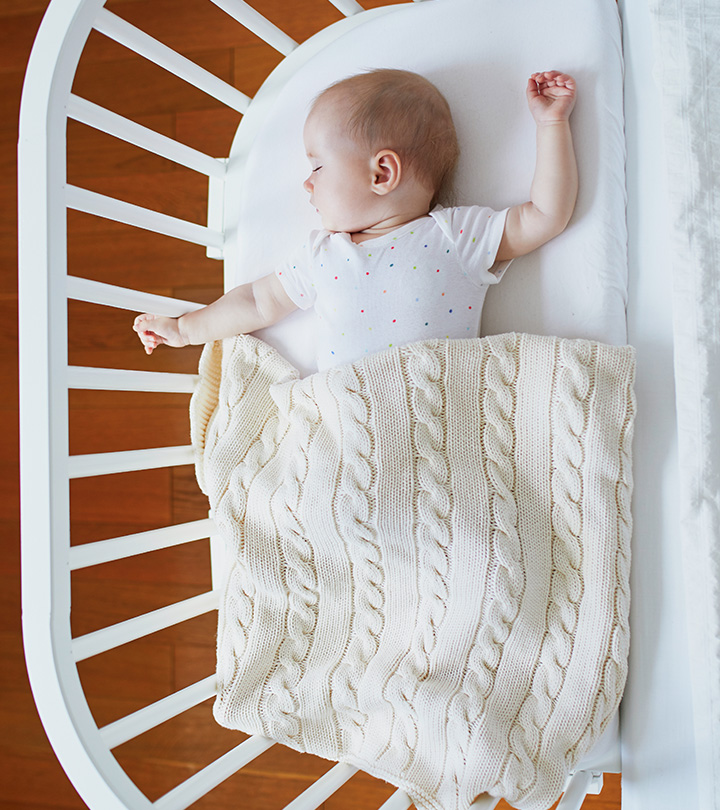Sleep training teaches the baby to sleep at a stretch for several hours without waking up in the middle of the night. It helps them sleep without the assistance of the mother or an adult. Approximately babies require up to 12 hours of sleep through the night and some naps during the day. However, they might not sleep at a stretch and take time to regulate themselves according to the biological clock. Read on to know how to sleep train a baby and what techniques could work.
What Is Sleep Training A Baby?
Sleep training a baby refers to the process of accustoming the baby to sleep comfortably at a stretch during the night. The baby can fall asleep without needing any assistance from the parents. It is important for the baby to get enough sleep to prevent any physical and mental health problems. Thus, sleep training is fundamental to the baby’s development (1).
Is Sleep Training Safe For Babies?
Studies indicate that sleep training is safe and effective for babies, and here’s what the proponents say:
- The bond between the baby and the parents has no negative consequences due to sleep training.
- Sharing the same bed with the infant might not be safe. However, sleeping in the same room as the baby is advisable to reassure your baby is well.
- Baby would learn self-soothing, and it helps them avoid nightly crying.
The scientific studies have not found any long-term risks are associated with sleep training the babies (2).
How To Sleep Train Your Baby?
The following tips could help you sleep train your baby (3) (4):
- Be patient as some nights can be tough while the other nights may be comparatively better. It takes time for the baby to adjust and follow a particular sleep cycle.
- Follow a consistent bedtime routine so that the baby’s natural sleep cycle gets accustomed to it sooner. Being inconsistent might confuse the baby and disturb the sleep cycle.
- Understand the need to stay away from the baby when they are crying. Eventually, they get tired and fall asleep.
- Allow the baby to self-soothe when you are not around. By doing so, they fall back asleep even without the parents’ help.
- Choose a sleep training method that works for your baby as every baby adapts differently and responds at their own pace.
- Allow the cycle to change and adjust as the child grows because every age and stage require different approaches.
- Stay positive and consistent for best results. You cannot expect the quickest results by following a particular method. Give it time.
- Follow sleep hygiene, such as turning off lights or electronics and keeping the room dark and cool. You can also bathe the baby before sleep.
- Schedule some time for daytime activities. Physical stimulation helps induce better sleep at night.
- In the beginning, a little soothing in the middle of the night may be required. Do not rush and pick up the baby; instead, soothe them inside the crib.
- Keep the nighttime feedings as little as possible. Avoid turning on the lights or comforting the baby in your arms.
- Use a set of soothing phrases before bedtime, so that the child will recognize them as part of the bedtime routine.
What Is The Right Age For Sleep Training A Baby?
You may wait until your baby is around four months old to start sleep training (5). At this age, it becomes easier for them to adopt new skills and be ready for sleep training. Also, their circadian rhythm develops at this age, which plays a role in helping them sleep at night. Most parents prefer beginning the training at the earliest possible age of four months, but six months is also not late, to begin with.
Sleep training could be effective when the baby is nine months old as they reduce their feeding bouts in the middle of the night. However, there is no specific way to know the exact time to begin sleep training for your baby. The sooner they get accustomed to the bedtime routine, the better is their temperament.
What Are The Ages And Stages Of Sleep Training?
The following are the usual nighttime sleep requirements for babies up to one year (6).
| Age | Stage | Total Nighttime Sleep Hours |
|---|---|---|
| 0-3 months | Newborns are not aware of day and night as they do not produce enough melatonin. Therefore, they need frequent feedings and parents should hold back training. | 8-10 hours |
| 4-6 months | Sleep training is recommended during this phase. At this age, babies are comfortable without being fed for 6-8 hours through the night. | 9-10 hours |
| 7-9 months | Babies’ daytime napping comes down to 2-3 hours that makes nighttime sleep last longer (7) | 10-11 hours |
| 10-12 months | Now that they are toddlers, they learn new skills and are less clingy to their parents. It is a good time to sleep train the child. | 11 hours |
Credit: Stanford Children’s Health
How Long Does It Take To Sleep Train A Baby?
It depends on the method you use to train the baby. On average, sleep training could be effective after around three to four nights. However, if the baby cannot adapt to a sleep cycle even after a couple of weeks, it is advisable to seek help from a pediatrician.
What Are The Different Sleep Training Techniques?
Here are some methods of sleep training a baby that might work (8):
- The cry it out method: This is an old approach to allow a baby to adapt to a sleep schedule. Most debates say allowing the baby to cry might self-soothe them to sleep as they get tired. However, it might not be comfortable for most parents to let their babies cry and worry about how much crying is involved (3).
- The Ferber method: Parents are supposed to let their children sleep alone even if they cry. They follow a strict time interval. Initially, they respond to the baby as they cry, and subsequently, the parent will increase the time to attend to the baby. The child gradually becomes less disruptive as they learn that no one will attend to them for that duration of time.
- The Pick-up, pick down method: This method involves picking up the baby when they cry and soothing them to put in the crib. Pick up, put down method provides the baby with the comfort they were craving, so they go back to sleep (9).
- The chair method: After putting the baby to sleep in the crib, sit on a chair next to them till they are completely asleep. Once they are asleep, you can leave the room. This gives the baby some form of reassurance that someone is there to look after them, and they feel safe enough to fall asleep.
- The bedtime fading method: This method suggests parents use verbal or physical comfort to soothe the baby crying before bedtime. Eventually, the parent moves away from the child in the distance while remaining in their sight.
How Does Bedtime Routine Fit Into Sleep Training?
Each method of sleep training a baby brings consistency in their sleep cycles. Since babies lack a sense of differentiating between day and night, bedtime routines help them understand nighttime and daytime. Following a similar pattern of calming activities during the night or before bedtime helps the baby realize the time to go to bed (3).
Frequently Asked Questions
1. Will my baby cry during sleep training?
Studies have shown that the baby cries for the longest time on day one of sleep training. However, it gradually decreases within a week (10).
2. Can I sleep train my baby for naps?
Yes. Babies can be sleep trained for naps. With a consistent bedtime routine, daytime naps can fall in place (3)
3. Does sleep training affect my baby psychologically?
While some say the cry it out method is harsh, other methods with a more gentle approach might not damage the baby psychologically (2).
4. Is sleep training similar to night weaning?
Sleep training a baby is not the same as night weaning. Sleep training is the approach to enable a baby to fall asleep by themselves. This makes the baby an independent sleeper as they will not need the parents’ assistance to sleep (8).
Night weaning is the concept of feeding the child with replacements of breast milk whenever the baby wakes up in the middle of the night. It helps establish healthy eating habits and stops the child from crying at midnight (11).
Sleep training a baby is a good approach as it gives a better quality of life for the baby and the parents. It can also help parents attain an easier approach to bringing up the baby. But remember, sleep training takes a lot of patience and effort.
References:
MomJunction’s articles are written after analyzing the research works of expert authors and institutions. Our references consist of resources established by authorities in their respective fields. You can learn more about the authenticity of the information we present in our editorial policy.
The following two tabs change content below.




































